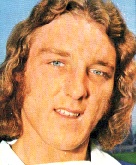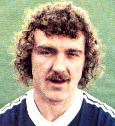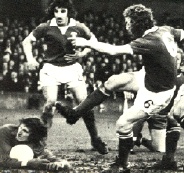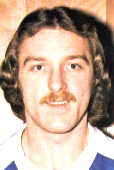
Kevin Beattie
Born Carlisle, December 18, 1953.
Sometimes things are just too good to be true. For Bobby Robson, then manager of Ipswich Town, the arrival of a brawny, wide eyed teenager off the train from Carlisle armed with a pair of football boots wrapped in brown paper and sixpence in his pocket proved to be one of them.
The youngster, Kevin Beattie, would quickly develop into a footballing collossus for Robson and Ipswich Town, possessing all the attributes neccessary to become one of English football’s all time greats, perhaps one of the world’s greats. Beattie would ultimately fail to truly deliver on this promise, however, mainly due to terrible injury problems although there was always a suspicion that he also had an ability to self destruct.
Robson, one of footballs’ truly great enthusiasts, could scarcely believe the gem he had been delivered by his northern scout in Beattie.
Robson quickly took to referring to Beattie as “Diamond” in recognition of his gifts although I prefer the nickname the player later earned in football generally, “Tank”.
A boy in a mans body, Kevin Beattie was quick, strong, tackled like an ox, was good in the air, comfortable with the ball at his feet and was dangerous going forward. In short, he had everything. He could easily have made it as a midfielder but his talents were best suited to defence, sometimes at left back but mainly at centre half.
Robson had seen his like before. Duncan Edwards was not a name the former England international would throw around lightly, having grown up as a contemporary and international teammate of the undoubted star of Manchester United’s Busby Babes, but he could not help but make the comparison, so much of Edwards did he see in Beattie.
Beattie made his first team debut on the opening day of the 1972-73 season at Old Trafford, the intimidating home of Manchester United FC. The newcomer was outstanding and apparently nerveless as Ipswich returned to East Anglia with a deserved victory.
There would be no settling in period for the youngster, Kevin Beattie had announced his arrival and he would remain a fixture in the Ipswich side until injuries started affecting his progress in the second half of the decade. Robson was building a capable side at Ipswich and the emergence of a ready made star like Beattie was a godsend to a manager working on a budget far more restricted than those of his competitors.
In Beattie’s first season at Portman Road, Ipswich won the Texaco Cup, nothing too sensational although it came courtesy of a victory over their bitter rivals Norwich City, and finished fourth in the league, thereby qualifying for Europe.
This success allowed Robson the luxury of keeping hold of his better players for a change and with Beattie and several other talents coming through the ranks the unfashionable club from the country was able to cement its’ place among the nations’ footballing hierarchy.
The 1973-74 season was another good one for Ipswich as a club and for Kevin Beattie personally. There was another fourth place finish in the league while Real Madrid, Lazio and Twente Enschade of Holland were defeated in the UEFA Cup before Locomotiv Leipzig knocked them out on away goals in the quarter finals of the competition.
There was also another win at Old Trafford, this time in the FA Cup , with Beattie rampaging forward to score the only goal with a typical header.
Beattie’s fine season was capped when he was voted the Young Player of the Year for 1974 by his fellow professionals.

The following season was also progressing nicely when Beattie became embroiled in controversy just before Christmas. Beattie had been selected by the recently appointed England manager, Don Revie, for an Under 23 training camp in Manchester. Mysteriously, Beattie never arrived. A couple of days later he was tracked down to his family home in Carlisle, complaining of stress and exhaustion but hoping that his international chances had not been harmed by his actions.
Revie did not seem the type of man who would forget such an aberration in a hurry. Whatever his mental and physical state there was no sign of his performances being affected. At twenty one, Kevin Beattie was already the lynchpin of this fine Ipswich side and patently one of the most consistently effective players in the first division.
This season there was a third place finish in the league but bitter disappointments in store in the cups. Ipswich lost to Norwich in the quarter finals of the League Cup but even that was nothing compared to the heartbreak suffered in the FA Cup.
Ipswich disposed of Wolves , Aston Villa, Liverpool and, after four gruelling games, Leeds United to reach the last four and the famous trophy appeared theirs for the taking.
After outplaying West Ham United over two games, however, Beattie’s team somehow managed to lose their replay, 2-1 on a Stamford Bridge quagmire. Of course they were not helped by the self important refereeing eccentric Clive Thomas who saw fit to disallow two “goals” by Bryan Hamilton during the tie. Thomas certainly never thought Hamilton deserved to be a hero.
Consolation came to Kevin Beattie in the shape of his first England Cap which he won in April 1975 when selected for the European Championship qualifier against Cyprus at Wembley, a game now famous for Malcolm Macdonald scoring all five goals in the 5-0 victory.
A more noteworthy appearance, and performance, came in the same years’ Home International clash with Scotland at Wembley. A dynamic new England side, epitomised by Beattie and the new captain Gerry Francis, seemed to be emerging and the 5-1 thrashing they inficted on the Scots here confirmed the sides’ potential.

Beattie’s raw power was seldom better demonstrated than when he roared forward to bury a far post header for England’s second goal.
Tragically, however, both Beattie and Francis would be denied the opportunity of prolonging their international careers much further because of their respective injury problems. Beattie’s penchant for finding trouble where there was none came to the fore at the most inopportune time as Ipswich were chasing the league title of 1977.
With the club well placed at Easter, Beattie was badly burned when a bonfire at his home got out of control and he attempted to keep it in check. Of the six games he was forced to miss Ipswich lost four, still finishing only one point behind the eventual champions Liverpool. Oh, Kevin.
More conventional injuries, and far more damaging to his career, now began to plague Beattie, whose knees would basically never be properly right again from this time on.
Ipswich struggled in the league the following season, as they made do without their star player for the first time since his emergence, although Beattie was fit to take part in a famous 3-0 victory over Barcelona in the UEFA Cup. He was unavailable again for the second leg, however, and Ipswich ended up going out of the competition on penalties.
Kevin Beattie was again fit when the club won through to the FA Cup semi finals, however, and played a full part as Ipswich turned on the style to dismiss West Brom 3-1 in the semis and see off Arsenal in the final with far more authority than the 1-0 scoreline would suggest.
There would be precious few high spots left for Beattie as crippling arthritis set into his right knee.
In 1981, during a brief spell when his knee allowed him to play, Beattie lined up for another FA Cup semi final against Manchester City only to suffer a broken arm during the game, which Ipswich eventually lost 1-0 after extra time. This injury would also cost him any chance of playing in the UEFA Cup final which the club would win the following month.

In October 1981, after five operations on his knee, Beattie again complained of pains in it and the writing was on the wall as far as his career was concerned. Shortly afterwards the man who looked as though he was made of granite had to accept defeat and announce his retirement. Beattie was awarded a testimonial match by Ipswich, 14,525 turning up to watch the match against Moscow Dynamo.
Bizarrely, Beattie was brought out of retirement the following season, first by his old defensive partner at Ipswich, Allan Hunter, at Colchester and then by Middlesbrough in the second division. There was no getting away from the excrutiating pain in his knees, however, and both these comebacks had to be quickly aborted.
One of Kevin Beattie’s claims to fame, which is not widely recognised, is the part he played in the filming of Escape to Victory, the strange, concentration camp feelgood football movie, which starred several Ipswich players as allied forces footballers. Beattie was employed as Michael Caine’s “skill double” and can apparently be spotted in some of the crowd scenes.

I can’t wait to see it again, the man with the massive sideburns, thick wavy hair and built like a brick outhouse surely can’t be that hard to spot in a German World War II prisoner of war camp.
Beattie offered a choice description of his co-star, Sylvester Stallone, after filming had finished. Beattie reckoned the American “actor” was, “an arrogant sod” and was also dismissive of Stallone’s attitude towards Paul Cooper, his goalkeeping coach for the movie.
“Cooper was supposed to teach him how to dive properly but he (Stallone) thought he could do it all himself,” Beattie revealed, then added “He’s not big enough to be a keeper anyway.” Whether this last comment was about Stallone or Cooper is not clear.
Perhaps the last words on the dreadfully curtailed career of one of England’s finest post war players should go to the man who worked with him the closest, Bobby Robson.
Robson scoffed at Beattie’s paltry tally of nine England caps and claimed it should have been ninety nine, before deciding that that figure would also have been insufficient for a talent that he believed had no bounds.
Perhaps Robson’s assertion that “Kevin Beattie was off the moon” was not really that far off the mark.
Kevin Beattie Career Stats
CLUB GAMES GOALS
Ipswich Town FC 228 24
Colchester United FC 4 0
Middlesborough FC 4 0
England 9 1
Total 245 26
